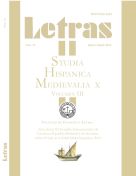Silence, orality, and medieval writing : the realization of the female corporality in the Libro de Apolonio
Keywords:
Female Characters, Knowledge, Corporality, Orality, WritingAbstract
It is widely known that one of the main peculiarities of Libro de Apolonio, a Castilian poem of the thirteenth century, is the new type of exemplariness that it promotes, bound by the critics to an “heroism of knowledge”. Such exemplariness seems to enthrone sapientia over an unworthy fortitudo, to raise the academic intellectual erudition over the strength that comes from the power exerted by the body. Nonetheless, moving the focus from the hero that gives name to the book to the main female characters, the idiosyncrasy of this knowledge exposes a new meaning. Through the female bodies, their ways, acts and proceedings, knowledge becomes a material subject, takes over the body, sinks its roots in the physical plane. In other words, it institutes dialectically itself in its relation with the corporal nature. Making room for this knowledge that impacts the body, that affects everyday living and, due to that matter, becomes material, is the purpose of this work. A non-innocent knowledge located in the body body, which never was so, a more human point of view, so characteristic of the thirteenth century.Downloads
References
Libro de Apolonio, ed. de Dolores Corbella, Madrid, Cátedra, 2007.
ALVAR, Manuel, 1986, “Apolonio, clérigo entendido”, en Symposium in honorem prof. M. De Riquer, Barcelona (Universidad de Barcelona y Quaderns Crema).
BALESTRINI, María Cristina, 2012, “De la Confessio amantis de John Gower a los textos ibéricos. Aventuras del sentido en las traducciones de la historia de Apolonio de Tiro”, en Modos de leer la escritura medieval. Docencia e Investigación en torno a las literaturas europeas de la Edad Media, comp. Lidia Amor, Buenos Aires, Editorial de la Facultad de Filosofía y Letras Universidad de Buenos Aires.
CHEVALIER, Jean y GHEERBRANT, Alain, 2009, Diccionario de Símbolos, Barcelona, Herder.
CUESTA TORRE, María Luzdivina, 1996, “Diversión y salud en el Libro de Apolonio”, en Anuario Medieval, 8.
————, 1997, “Uso del poder y amor paternal en el Libro de Apolonio”, coord. José Manuel Lucía Mejías, Actas del VI Congreso Internacional de la Asociación Hispánica de Literatura Medieval (Alcalá de Henares, 12-16 de septiembre de 1995), Vol. 1.
————, 1999, “La muerte aparente: un episodio del Libro De Apolonio”, Livius, 13.
DEYERMOND, Alan, 1968-1969, “Motivos folklóricos y técnica estructural en el Libro de Apolonio”, en Filología, 13.
————, 1989, “Emoción y ética en el Libro de Apolonio”, en Vox Romanica, XLVIII.
DUBY, Georges, 1986, “La catedral, la ciudad, la escuela”, en Europa en la Edad Media, Barcelona, Paidós.
FUNES, Leonardo, 2009, “La evolución literaria como contienda de prácticas discursivas”, en Investigación literaria de textos medievales: objeto y práctica, Buenos Aires, Miño y Dávila.
LACARRA, María Jesús, 1988, “Amor, música y melancolía en el Libro de Apolonio”, ed. Vicente Beltrán, en Actas del Congreso de la Asociación Hispánica de Literatura Medieval, Barcelona, PPU.
MAYOL, Pierre, 1994, “El pudor de la conversación”, en Blablablá. La conversación entre la vida cotidiana y la escena pública, comp. Cecilia Magadán, Buenos Aires, La Marca.
RODRÍGUEZ-VELASCO, Jesús, 2007, “Mediación y agencia: el trabajo de la clerecía”, en Hispanic Review, Volumen 75, N° 4.
WHITE, Tristan Harvey E., 1997, “The Taboo of Antioch: Incest and its Consequences in the Libro de Apolonio”, en “Quien hubiese tal ventura:” Medieval Hispanic Studies in Honour of Alan Deyermond, ed. Andrew M. Beresford, London: Department of Hispanic Studies, Queen Mary and Westfield College, 1997.
ZUBILLAGA, Carina, “Entre la aventura y la santidad medieval: Luciana y Tarsiana en el Libro de Apolonio”, en FUNES, L. Hispanismos del Mundo, diálogos y debates en (y desde) el Sur, Buenos Aires, XVIII Congreso de la Asociación Internacional de Hispanistas, 2016.
Downloads
Published
How to Cite
Issue
Section
License












